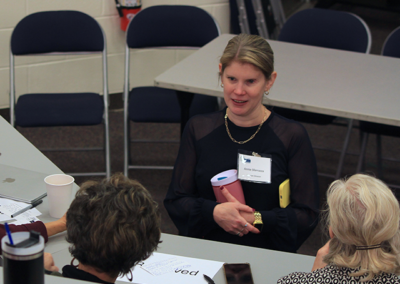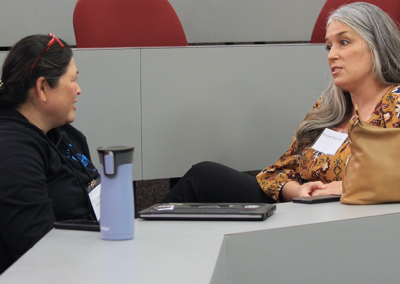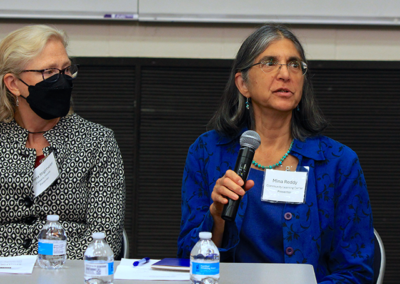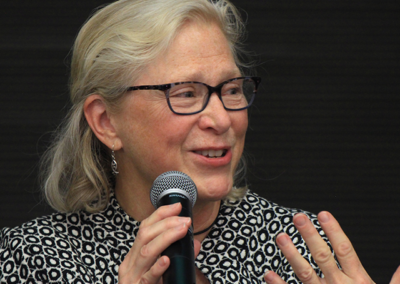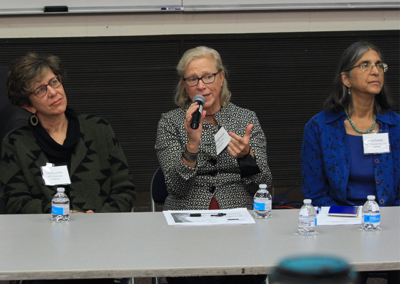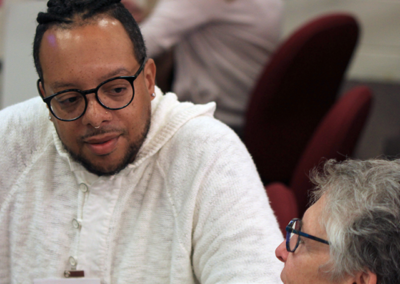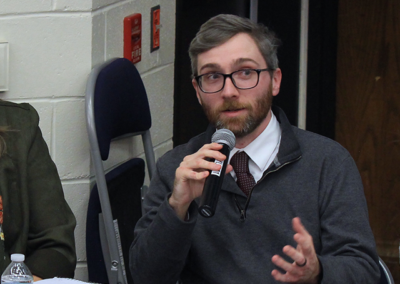Spotlight On Innovation Highlights The Importance of Making Learning Affordable and Accessible
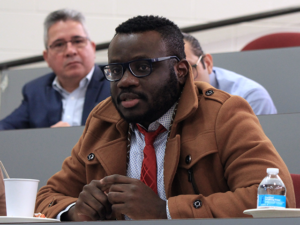
Dr. Vitalis Osuji listens to the grant recipients present during the Spotlight On Innovation In Adult Basic Education. Photo Credit: Jake Witherell.
BOSTON, MA – On Friday, November 7th, First Literacy hosted the Spotlight on Innovation in Adult Basic Education at Bunker Hill Community College. The annual event featured innovative new programs that are sparking change, testing fresh approaches, and opening doors for adult learners who are working hard to build better futures.
Too often overlooked, adult literacy can be life-changing for those who slipped through the cracks of the education system or for those whom English is a new language. The ability to read and write can open pathways to fulfilling careers that benefit families and communities. First Literacy grants are dedicated to making education accessible by funding innovative projects geared to teaching adults essential skills.
This year’s event kicked off with a keynote speaker who has been directly impacted by First Literacy’s programs. Dr. Vitalis Osuji, a former First Literacy scholar, spoke about his journey as an adult learner and the challenges he overcame to achieve his dream of becoming a doctor.
Dr. Osuji moved to the U.S. from Nigeria in 2009 with hopes of a better life. He arrived with nothing but determination to achieve his end goal of becoming a doctor. Dr. Osuji expressed his gratitude to First Literacy, highlighting the organization’s pivotal role in transforming the lives of adult learners.
“It makes it easier when an organization believes in you, an organization invests in you, an organization tells you that you too can become whatever you put your mind to if you work hard at it,” said Dr. Osuji.
Dr. Vitalis emphasized that the high cost of education puts college out of reach for many adult learners.
“I had lots of financial hardships. It’s one thing to get into college, but it’s another to pay for college,” said Dr. Osuji. “Having First Literacy provide a scholarship not once, but twice helped me get through college,” said Dr. Osuji.
As he closed his keynote, Dr. Osuji encouraged educators and adult learners to keep going and keep pushing.
The program initiatives highlighted by grant recipients during the event included:
- A curriculum development project to equip volunteer ESOL staff with teaching tools and strategies to serve newly arrived immigrants with little or no English skills.
- A comprehensive Juvenile Justice Diversion Program that helps first-time offenders avoid criminal records and improve educational and employment outcomes.
- A Mother/Child Reading Program for women incarcerated at the Western Mass Regional Women’s Correctional Center.
- A program to help students pass their final HiSET Exam.
- A research project led by adult learning students.
- A leadership skills training program that provides activities and coaching for adult learners.
ABCD Boston-Roslindale ESOL also shared how they used a First Literacy replication grant to implement and expand an ESOL curriculum originally developed by Casserly House. The teaching tools and best practices in ESOL teaching strategies were developed by Casserly House via a consultant with an initial First Literacy Grant in 2023-2024.
Donna Stiglmeier, Director at Casserly House, highlighted the role of First Literacy in providing seed money to improve their program significantly.
“Thanks to First Literacy we were able to develop tools that helped Casserly House get more grants,” shared Stiglmeier. “But the biggest outcome was that adult learners were learning and building a sense of community.”
Spencer McIntyre, Advisor and Instructor at The Literacy Project, shared how their Participatory Action Research Project was an effective way to make learning accessible. “Students at all levels could come to a workshop and feel as though they were participating in the project and meaningfully contribute,” he described, emphasizing that many students really enjoyed the project and were already asking if they could participate again.
Supported by a First Literacy grant, The Literacy Project implemented an action research project, led by adult learning students, to collect information related to recruitment, enrollment and persistence in a rural adult basic education program. The goal was to strengthen literacy skills of adult learners as they work on their writing skills by creating interview questions and exploring best practices in research projects.
Mhamed Jounaidi, an Instructor at the Community Learning Center, spoke about the Students Are Leaders Program that was successful in helping adult learners develop transferable leadership skills. “Most of our students are leaders in a certain capacity in their home countries and we are trying to help these students share their knowledge and expertise,” he said, noting that after finishing the program many participants went on to accept paid leadership positions.
In addition to awarding grants, First Literacy offers free professional development for adult educators and provides scholarships to adult learners pursuing higher education. Since its founding in 1988, the organization has allocated over $6 million to support educators and innovative literacy programs, while awarding more than 600 scholarships.
Photo Credit: Jake Witherell

